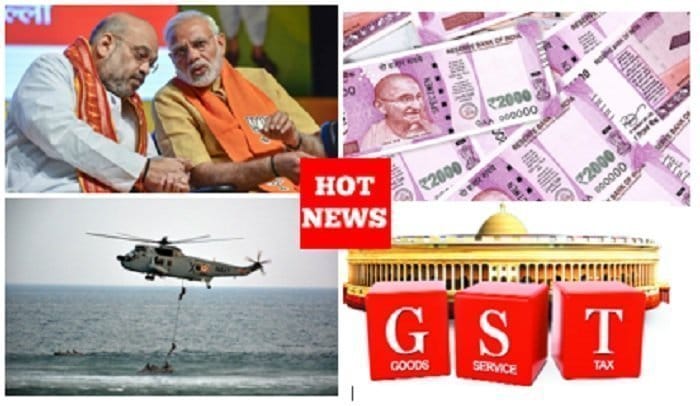
Elections are considered as the biggest festival in a democracy due to overwhelming numbers that participate in the process. It is through elections that people participate in the formation of government. People become participants in decision making through elections, as only the winning party assumes power and takes decisions and forms policies.
In India, elections are held after every five years and the main purpose is to elect representatives to parliament, state assemblies and local bodies. As the elections approach, certain factors assume more importance and dominate the debates during elections.
Among many factors which will influence 2019 Lok Sabha elections are national security, demonetization and GST.
After the recent escalation of tension between India and its neighboring country, Pakistan, the issue of national security has assumed significant importance. The suicide attack by a terrorist that killed Indian paramilitary personnel assumes added significance as it occurred just a few months prior to the general elections in India.
Indian government’s subsequent response to it was praised by all. Few BJP leaders like Yeddyurappa and Rajiv Pratap Rudy gave statements which indicated that they are trying to en cash public sentiments which praised the government for sending fighter planes to Pakistan to decimate Jaish-e-Mohammed’s terror camps at Balakot.
Along with the IAF, PM Modi too was applauded for the response given to the terrorist attack as it is for the first time that India has responded to terrorism in such an aggressive manner. BJP government was also credited for rescuing the captured Wing Commander, Abhinandan, from the captivity of Pakistan army, that too without making any major compromises which added another feather to PM Modi’s cap.
Amidst the intensifying war of words and action between the two countries, the only beneficiary seems to be BJP. Obviously, there is another school of thought according to which only the Indian army should be given the credit for India’s response to terrorist attacks and sacrifices of soldiers but majority of the people are praising Modi also for this new aggressive face of India.
However, things have not gone well for BJP in terms of economy. Demonetization by the Government in 2016 has received mixed responses. Although demonetization aimed to tackle 3 malaises that had plagued the Indian economy – parallel economy run by black money, counterfeit currency and terror funding but it wasn’t successful. 99.3% of demonetized currency came back in circulation and it included black money as well.
Terrorist activities too have not stopped. Problems faced by citizens post demonetization like clamour for cash, queuing for exchange of notes and deposits, withdrawals from banks & ATMs are still fresh in their minds. Small and medium businesses have suffered majorly post demonetization and from BJP government’s push for cashless transactions because people are accustomed to doing business with cash, therefore to transform them to doing cashless transactions needed time which the government did not give.
Though the government was trying to educate people in use of cards, net banking and mobile cash transfers but impatience due to long queues for cash and fear of losing savings during net banking made a lot of people critical of PM Modi. Though the situation is stable now, Modi was criticized by a lot of people, including the opposition (obviously) for this decision. The long-term effects
The GDP came down to 7.11% (2016-17) from 8.01% (2015-16) due to less availability of cash in cash-intensive industries. It was because of demonetization that the real estate market suffered a major setback as it led to a decline in the price of properties. When BJP won UP’s state assembly election, it looked as if people have supported Modi on demonetization as he had painted it as a fight against corruption but recent reverses it suffered in MP, Rajasthan & Chhattisgarh indicated that the slowdown in economy and loss off business has not gone down well with the people.
Another major decision taken by the BJP government was introduction of Goods and Services Tax (GST). The main objective of incorporating GST was to eliminate tax on tax or double taxation, which cascades from the manufacturing level to the consumer level.
Its initial implementation had some flaws but in the long run, it will benefit everyone – the consumers, the trade and the government. More than 150 countries across the world have adopted GST or similar acts, which itself proves that this policy has passed the “time test”. GST has reduced the burden on the common man by reducing the cost of goods.
GST will also keep a check on tax evasion by the traders and the shopkeepers thereby controlling the black money circulation. GST has led to an increased transparency in taxation and thus it is more efficient than other taxation systems. As it is a long beneficiary reform, it has not created a huge impact in the minds of the voters.
The next few months will tell whether BJP will benefit or not from its policies on national security, demonetization and GST during the forthcoming Lok Sabha elections but the mileage it expected has been short of expectations.
